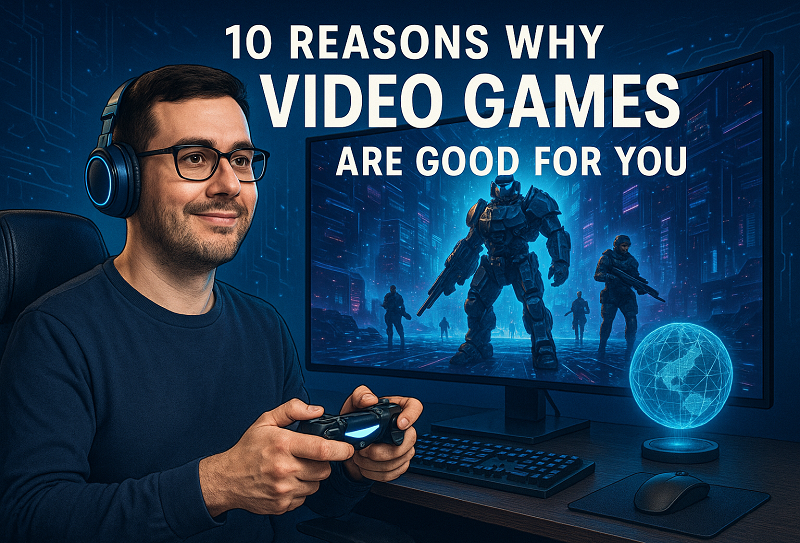Let’s be real — video games have carried the “bad influence” label for years. You’ve probably heard it all before: they’re a waste of time, they promote violence, they’re bad for your health. But what if we told you that science, psychology, and even educators are now saying the exact opposite?
Yup. It turns out video games might actually be good for your brain, body, and social life — when used in the right way. So whether you’re an avid gamer, a skeptical parent, or just curious, here’s a deep dive into the real benefits of gaming.
1. Games Boost Cognitive Skills Like a Gym for Your Brain
We’re not talking about just shooting zombies here. Studies from institutions like the University of Rochester have shown that gamers often outperform non-gamers in tasks involving attention, spatial awareness, multitasking, and decision-making.
Strategy games like StarCraft and Age of Empires require planning, resource management, and adaptive thinking. Puzzle-based games such as Portal or The Witness challenge players to use logic and experiment. Even fast-paced shooters improve selective attention and visual acuity.
🧠 Did you know? A 2013 study published in Nature found that playing 3D video games improved memory formation, spatial navigation, and fine motor skills — especially in older adults.
2. Improved Decision-Making and Faster Reaction Times
Games force you to make decisions in a split second. Whether it’s dodging an enemy in Elden Ring or choosing the best dialogue option in Mass Effect, quick thinking becomes second nature.
Researchers from the University of Rochester found that players of action games developed faster reaction times and more accurate decision-making — even in non-gaming scenarios like driving or navigating emergencies.
That “twitch reflex” isn’t just for gaming. It’s applicable in real-life jobs, sports, and high-pressure environments.
3. Video Games Train Working Memory and Mental Flexibility
Your brain’s working memory — the ability to hold and manipulate information — plays a key role in learning and productivity. Turns out, video games help here too.
Games like Minecraft or Kerbal Space Program require players to remember systems, patterns, sequences, and structures. This kind of mental juggling improves the brain’s executive functions — a set of cognitive skills that include planning, focus, and multitasking.
🎮 Fun Fact: A 2020 study published in Frontiers in Human Neuroscience found that gamers had superior working memory performance compared to non-gamers, particularly in complex, real-time environments.
4. Games Foster Social Skills and Online Communities
Forget the stereotype of the isolated basement gamer. Today, multiplayer games are deeply social experiences. Platforms like Fortnite, Valorant, or Among Us connect millions of players around the world — encouraging teamwork, communication, and social bonding.
Voice chat, clan systems, and online co-op modes foster real relationships. And for introverts or people with social anxiety, gaming often serves as a safe, low-pressure space to connect with others.
📱 True Story: A study in CyberPsychology & Behavior showed that over 70% of gamers play with friends in real life, and many meet new ones through games. It’s not anti-social — it’s differently social.
5. Gaming Helps With Stress Reduction and Emotional Resilience
Life is stressful — and video games offer a unique escape. Whether you’re solving puzzles in Monument Valley, escaping into The Legend of Zelda, or managing a farm in Stardew Valley, games provide a sense of control, progression, and emotional release.
Research from the American Psychological Association found that moderate gaming helped reduce stress, increase mood, and promote relaxation.
🧘 Pro Tip: Even action-heavy games can provide catharsis — giving players a safe space to vent frustration or anxiety without real-world consequences.
6. Goal-Setting and Motivation Systems Mirror Real Life
Games are goal-setting machines. Whether you’re grinding levels, finishing side quests, or unlocking achievements, the structure of games taps into your brain’s reward systems.
This teaches persistence, patience, and strategic planning. The concept of delayed gratification (working for long-term rewards) is built into every progression system, from World of Warcraft to The Sims.
💡 Real-Life Takeaway: This “grind mindset” helps develop grit — a key psychological trait linked to success in academics, career, and personal growth.
7. Career Opportunities and Skill Development
Gaming can be more than just a hobby — it can launch careers. Game design, storytelling, coding, voice acting, esports, streaming, content creation — the industry is booming and more accessible than ever.
Even if you’re not trying to go pro, gaming teaches hard and soft skills:
- Leadership (managing teams in MMOs)
- Time management (balancing in-game schedules)
- Communication (especially in co-op or competitive environments)
- Creativity (modding, content creation, designing builds)
And yes, playing games can even help you learn to code. Tools like Minecraft Education Edition and Roblox Studio are already being used in classrooms.
8. Storytelling in Games Increases Empathy and Emotional Intelligence
Games don’t just test your reflexes — they tug at your heart. Titles like The Last of Us, Gris, and Life Is Strange are narrative powerhouses that explore grief, loss, morality, identity, and love.
By placing players directly in emotional scenarios and forcing difficult choices, games promote empathy and emotional literacy in ways books or movies can’t.
🧠 Scientific Insight: A 2018 study in Psychology of Popular Media Culture found that role-playing and story-rich games increased players’ ability to understand and respond to others’ emotions.
9. Hand-Eye Coordination and Motor Skills Improvement
Whether it’s aiming in Apex Legends or navigating tricky levels in Super Mario Maker, games improve your coordination. You’re syncing your eyes, brain, and hands constantly.
In fact, surgeons who played video games were found to make fewer errors and perform faster in laparoscopic procedures compared to non-gaming counterparts. (Yes, this is a real study published in Archives of Surgery.)
🎮 Gaming isn’t just fun — it literally trains your body and brain to work in sync.
10. Mental Health Benefits: From Therapy to Self-Expression
Video games are increasingly being used in mental health treatments. There are therapeutic games designed to help with anxiety (like SPARX, a game used to treat teen depression), and VR-based games are used for phobia exposure therapy.
Even mainstream games help. For players dealing with depression or trauma, titles like Celeste, Spiritfarer, or Journey offer emotional processing, calm spaces, and meaningful storytelling.
🌱 Final Note: Games aren’t a substitute for therapy — but they can be a meaningful support tool in managing emotions, feeling understood, and finding joy.
Final Thoughts: The Game Has Changed
The science is in: video games aren’t just entertainment — they’re cognitive training, emotional development, and social connection, all wrapped in immersive, interactive experiences.
Sure, too much of anything can be bad — but balanced, thoughtful gaming can make you sharper, kinder, more resilient, and more connected.
So the next time someone says video games are a waste of time? Feel free to hit pause, share the research — and then go back to finishing that boss fight.
Because gaming isn’t just a pastime. It’s a power-up for real life.


